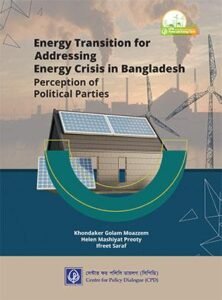 The political perception on different aspects of the power and energy sector of Bangladesh varies depending on different party ideologies, scientific knowledge and understanding, experiences, public demand, national mood and the country’s overall socio-economic condition. Political party representatives explicitly acknowledge the urgency and importance of energy transition while ensuring energy security in Bangladesh. The power and energy sector has always been perceived as one of the key components for the political party manifestos to connect with the mass people. However, the presence of fossil fuel is also prominent in their manifestos with the expansion of power generation capacity. Unfortunately, commitments and pledges on renewable or clean energy and the strengthening and upgradation of the transmission and distribution system towards that direction have been found insignificant in the manifestos of all political parties. A number of challenges are hindering the just energy transition in Bangladesh. They include the prominence of fossil fuel in the public discourse about energy, unclear trajectory towards energy transition, unwillingness to involve peoples’ representatives and national experts in the policy-making process, not fully functional National Parliament and a lack of political coalition and consensus on energy narratives.
The political perception on different aspects of the power and energy sector of Bangladesh varies depending on different party ideologies, scientific knowledge and understanding, experiences, public demand, national mood and the country’s overall socio-economic condition. Political party representatives explicitly acknowledge the urgency and importance of energy transition while ensuring energy security in Bangladesh. The power and energy sector has always been perceived as one of the key components for the political party manifestos to connect with the mass people. However, the presence of fossil fuel is also prominent in their manifestos with the expansion of power generation capacity. Unfortunately, commitments and pledges on renewable or clean energy and the strengthening and upgradation of the transmission and distribution system towards that direction have been found insignificant in the manifestos of all political parties. A number of challenges are hindering the just energy transition in Bangladesh. They include the prominence of fossil fuel in the public discourse about energy, unclear trajectory towards energy transition, unwillingness to involve peoples’ representatives and national experts in the policy-making process, not fully functional National Parliament and a lack of political coalition and consensus on energy narratives.
This paper lays out three sets of recommendations for the elected party, new members of the National Parliament and opposition parties. The upcoming elected government should create a fully functional parliament where the policy, plan, and acts can be presented and passed and discontinue discriminatory, non-competitive policies and set up a committee with specialists and climate-responsive people to prepare a roadmap for attaining the 40 per cent renewable energy target by 2041. The appointed members of National Parliament should utilise the opportunity to put pressure on the government by creating consensus among fellow parliamentarians, promote parliamentary debates and discussions for renewable energy roadmap to achieve the target, and make sure that the sectoral policies, rules and acts of this sector are presented and passed as bills in parliament. Lastly, political parties with a spirit of activism can mobilise the peoples’ movement through knowledge sharing and create a public mood in favour of renewable energy.
Press Release of the publication
Authors: Khondaker Golam Moazzem, Helen Mashiyat Preoty, Ifreet Saraf
Publication Period: December 2023



